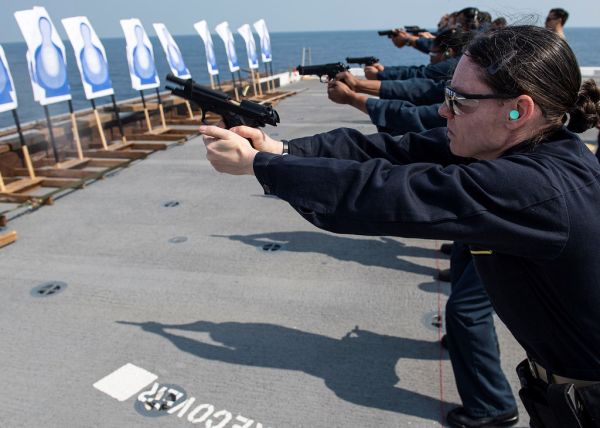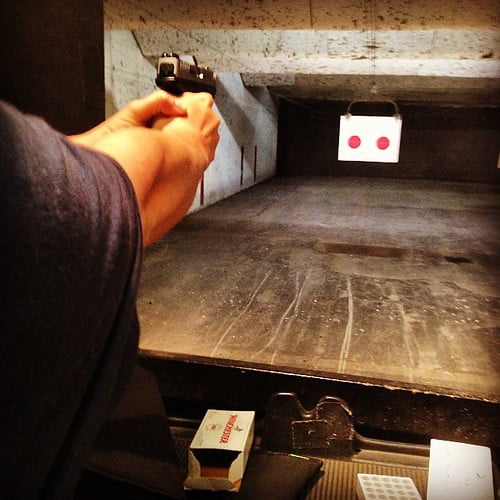How Many Db Is a 9mm Gunshot?
Ponder this – the piercing sound of a 9mm gunshot reaches roughly 163 dB, a decibel level that demands attention. But, have you ever considered the lasting impact beyond the initial blast? Understanding the implications of such high decibel levels is crucial for safeguarding your hearing health. So, what measures can be taken to shield yourself from the harmful effects of this thunderous noise?
We are supported by our audience. When you purchase through links on our site, we may earn an affiliate commission, at no extra cost for you. Learn more. Last update on 9th July 2025 / Images from Amazon Product Advertising API.
Average Decibel Level of 9mm Gunshot
On average, a 9mm gunshot typically produces a sound pressure level ranging from 158 dB to 164 dB, with variations based on factors such as ammunition type and barrel length. This level of sound is considered extremely loud and falls well above the threshold for potential hearing damage. The intensity of a 9mm gunshot creates a significant risk of permanent hearing loss if one is exposed without adequate hearing protection.
When a 9mm pistol is fired, the noise generated can reach levels exceeding what the human ear can safely tolerate. The dB range of 158 dB to 164 dB indicates not only the loudness of the sound but also the substantial energy carried by the acoustic wave produced by the gunshot. This energy, when it reaches the ear, can cause immediate harm to the delicate structures responsible for our hearing.
Without the proper protection, exposure to a 9mm gunshot can result in irreversible harm to your hearing. The impact of such high decibel levels on the auditory system can lead to permanent damage, affecting your ability to hear and communicate effectively. Therefore, it is crucial to prioritize hearing protection when engaging in activities involving firearms to safeguard your long-term auditory health.
Comparison of 9mm Gunshot Db Levels
Exceeding safe hearing thresholds, a 9mm gunshot typically produces sound levels around 163 decibels (dB), presenting a significant risk of permanent hearing damage according to OSHA guidelines. The sound pressure generated by a 9mm gunshot is substantial, emphasizing the need to protect your hearing when exposed to such powerful centerfire firearms. Comparatively, the noise level of a 9mm gunshot falls within the range of other centerfire pistols, which usually average around 160 to 168 dB.
To reduce the sound impact of a 9mm gunshot and mitigate the risk of causing permanent hearing damage, using a silencer can be effective. Silencers can lower the noise level of a 9mm gunshot by 25 to 40 dB, significantly decreasing the potential harm to your ears. Additionally, utilizing appropriate Hearing Protection such as over-ear earmuffs with a Noise Reduction Rating (NRR) of 25 to 33 dB can provide similar noise reduction benefits as a silencer.

Impact of 9mm Gunshot Noise
When encountering the noise from a 9mm gunshot, understanding its impact on hearing health is crucial. Here are three key points to consider regarding the noise levels and potential hearing damage associated with a 9mm gunshot:
- Noise Levels: A 9mm gunshot typically produces sound levels ranging from 160 to 163 dB, well above safe thresholds for hearing protection. This intense noise can cause immediate and irreversible damage to your hearing if proper precautions are not taken.
- Silencers: Utilizing silencers can reduce the noise generated by a 9mm gunshot by 25 to 40 dB, significantly lowering the risk of hearing damage for both the shooter and those in the vicinity. While silencers can make shooting quieter, they may not reduce the noise to completely safe levels.
- Protect Hearing: When using a firearm, especially one that produces loud noises like a 9mm handgun, it is essential to prioritize hearing protection. Employing earplugs or earmuffs designed to attenuate high dB levels can safeguard your hearing and mitigate the risk of long-term damage.
Understanding the potential impact of a 9mm gunshot noise on your hearing underscores the importance of taking proactive measures to protect your auditory health when using firearms.
Hearing Damage Risk From 9mm Gunshot
To assess the potential hearing damage risk from a 9mm gunshot, understanding the intense sound pressure it generates is paramount. A 9mm gunshot produces noise levels around 163 dB, surpassing safe thresholds for hearing protection. Exposure to a single 9mm gunshot can result in immediate and permanent damage to your hearing. The high intensity of sound pressure from a 9mm gunshot poses a significant risk of irreversible hearing loss. Utilizing appropriate ear protection is essential when faced with a 9mm gunshot to prevent auditory damage. The sheer loudness of a 9mm gunshot underscores the critical need to employ suppressors or ear protection to mitigate the risks posed to your hearing health. Without adequate protection, the impact of the sound pressure levels generated by a 9mm gunshot can lead to long-lasting or even permanent damage to your hearing capabilities. Therefore, it is imperative to prioritize the use of hearing protection devices when in environments where exposure to a 9mm gunshot is possible to safeguard your auditory well-being.

Mitigating 9mm Gunshot Noise
Utilizing appropriate ear protection is essential in mitigating the intense noise levels produced by a 9mm gunshot to prevent hearing damage. When looking to reduce gunshot noise and protect your hearing effectively when firing a 9mm firearm, consider the following:
- Use Hearing Protection: Always wear earmuffs or earplugs designed to attenuate high sound levels when shooting a 9mm handgun. This simple step can significantly lower the risk of immediate and irreversible hearing damage caused by the intense noise levels of a 9mm gunshot.
- Consider Suppressors: Utilizing a suppressor on your 9mm firearm can reduce the noise level by 20-30 dB. This reduction in sound intensity can make a substantial difference in protecting your hearing health, especially during prolonged shooting sessions or in indoor shooting ranges where noise levels can be even more intense.
- Choose Wisely – Suppressed vs. Unsuppressed: When possible, opt for shooting with a suppressed 9mm handgun over an unsuppressed one. The reduced noise level from a suppressed firearm not only safeguards your hearing but also contributes to a more comfortable shooting experience for you and those around you.

